 Iran’s Attack on Israel
Iran’s Attack on Israel
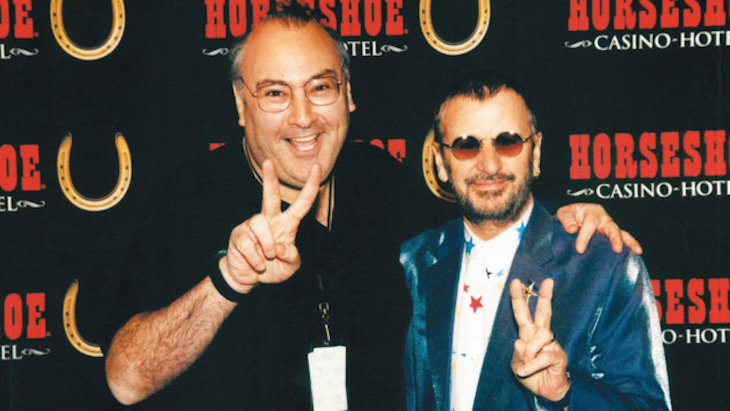

11 min read
David Fishof makes dreams come true, while staying committed to his Jewish values.
You don’t need to spend years practicing an instrument, or playing humiliating no-paying gigs, or networking with industry suits, or doing any of the soul-sucking things one usually does to play on stage with bona fide rock greats – you don’t even need to be any good – you just need to attend the Rock ’N’ Roll Fantasy Camp. At the Rock Camp, you perform on stage with the people on the posters that covered the walls of your teenage bedroom. People like Paul Stanley and Gene Simmons from Kiss, Steven Tyler and Joe Perry from Aerosmith, Roger Daltrey from the Who, Alice Cooper, Vinny Appice (Black Sabbath, Dio), Rudy Sarzo (Ozzy Osbourne, Whitesnake, and virtually every late-80s hair band), Lita Ford, Tony Franklin (the Firm), and on and on and on. If you love rock ’n’ roll, the Rock ’N’ Roll Fantasy Camp is literally a dream come true.
But even better, the Rock ’N’ Roll Fantasy Camp also happens to be Jewish.
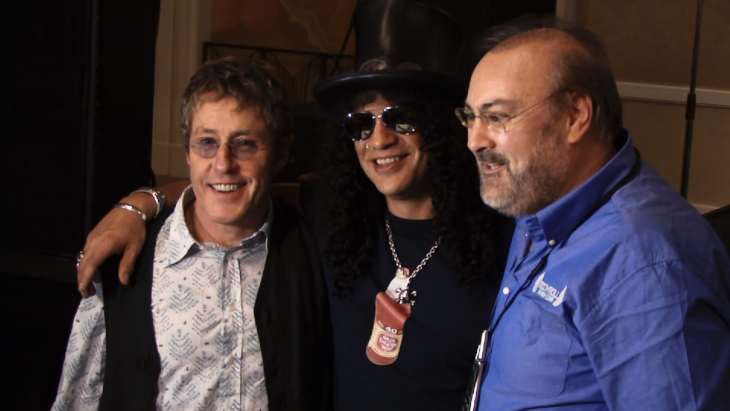 David Fishof (R) with Roger Daltrey (L) and Slash from Guns N Roses
David Fishof (R) with Roger Daltrey (L) and Slash from Guns N Roses
The camp first launched in 1997, and is the brainchild of music promoter and rock impresario, David Fishof, who started the camp after years promoting multinational tours, and managing A-list athletes. Fishof is the son of a Holocaust survivor, grew up in northern New Jersey – where his father worked as a cantor for 30 years – and got his start, like most Tri-State Area Jews his age, in the Catskills.
“I was working as a waiter and as a busboy, and my brother had a Jewish rock band called the Ruach Revival,” Fishof says. “My brother was a drummer. He’s six years older than me. He played behind Shlomo Carlebach, toured, and played NCSY and things like that.”
The Ruach Revival were a mainstay of 1970s/early ‘80s youth movement, and Fishof wanted to be in the band. The only problem was, he wasn’t good enough. But his father had a better idea.
“My father told me, ‘Why don’t you book six bands?’” Fishof says. “‘You can be an agent and book six bands a night.’ That’s when I decided that I was going to book bands, and started booking artists in the Catskills.”
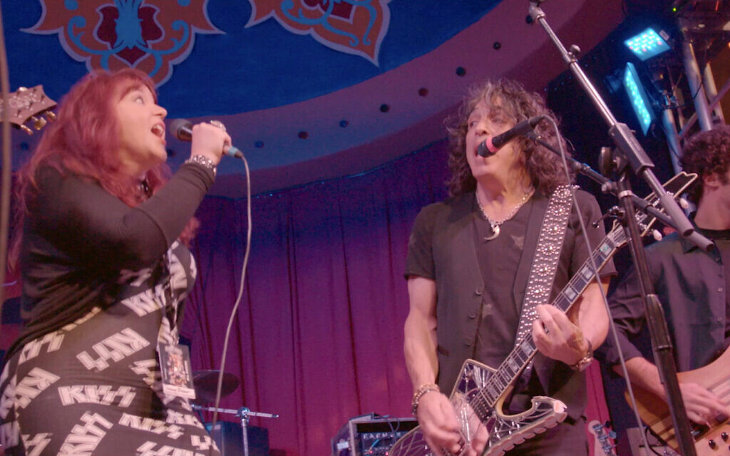 Rock Camp attendee Tammy Fisher and Paul Stanley from KISS.
Rock Camp attendee Tammy Fisher and Paul Stanley from KISS.
That was just the beginning. Fishof wrote a column about Jewish entertainers for the Jewish Press, which morphed into bringing athletes to speak at Jewish summer camps. His clients included people like Yankee’s sluggers Elliott Maddox and Lou Piniella, whom he also arranged endorsement deals with New York area businesses. He even negotiated contracts for Piniella and others with legendary Yankee’s owner, George Steinbrenner. His status as a sports agent grew, and soon he represented most of the New York Giants’ offensive line.
“I started representing the Giants’ quarterback, Phil Simms,” Fishof says. “Phil Simms introduced me to his entire offensive line, and that team made it to the 1987 Super Bowl. I had nine players in that Super Bowl, which was Super Bowl XXI.”
Despite his growing profile and the challenges that accompany the around-the-clock management of celebrity athletes, Fishof is an observant Jew, and never compromised his lifestyle or values.
“When the Giants went to the Super Bowl in 1987, they were playing against the Denver Broncos, and all the hype was about [Denver quarterback] John Elway,” Fishof says. “The Broncos were favored to beat the Giants – Simms never really got his recognition – and I went to California for the game. Deals were coming in every day. Pepsi was calling. I made that Disney World commercial, which was the first year when a player said, ‘I am going to Disney World!’ So I had to be out there for the week. I said to Phil on Friday, ‘I have to leave for the Sabbath. I’ll be at this Holiday Inn in Los Angeles. If anyone needs me, they can call, leave a message, and I’ll call them back after Sabbath.
"Phil said to me, ‘Mr. Fishof, your Sabbath is more important than the Super Bowl. Go enjoy.’ And that Sunday he broke every Super Bowl record of every quarterback [highest passer rating (150.9), highest completion percentage (88% or 22 for 25), and most consecutive completions (10)]. He played his greatest game ever. That line that Simms said to me has resonated with me every Friday. I always say, if a non-Jew can tell me how important it is to observe Shabbos before his biggest game ever, we Jews should be celebrating Shabbos.”
If a non-Jew can tell me how important it is to observe Shabbos before his biggest game ever, we Jews should be celebrating Shabbos.
Fishof built a great business as a sports agent, but he was about to change focus. Through his accountant, he had an office in Manhattan, which he shared with the managers of the biggest musical acts of the day. His officemate’s clients included artists like Madonna, the Talking Heads, the Ramones, the B-52s, Alice Cooper, Meatloaf, and many others. The atmosphere was exciting, and he wanted in on the action. One day, an opportunity came from almost out of nowhere.
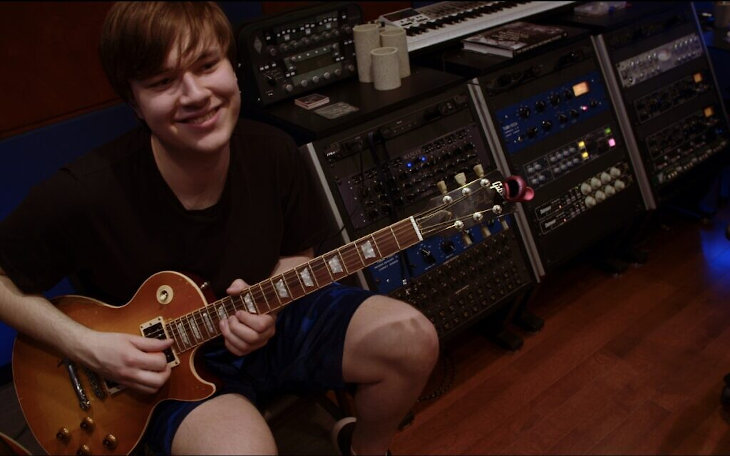
Blake Meinhardt was diagnosed with autism at age four, and his father brought him to Rock Camp to help build his son’s confidence. Today, Blake attends college at Kent State University.
“I got a phone call to see if I was interested in representing The Association,” Fishof says about his introduction to the then almost-forgotten 1960s pop band. “I said, ‘The association of what?’ I hadn’t really heard of them, but I went to California to meet them. I asked to hear their old stuff, and I remembered all those amazing songs like ‘Windy,’ Never My Love,’ ‘Cherish,’ ‘Along Comes Mary’ – I remembered all these songs from the dentist’s office. I decided to take them on. I harassed every agent I knew to help me out, and they booked them. Based on the success of The Association that year, I then got a calls from the Turtles, Gary Puckett and the Union Gap, Spanky and Our Gang – all these bands said, ‘Who’s this guy David Fishof who’s getting all this work?’ That was in 1983. In 1984, I created a package called the Happy Together Tour [named for the Turtle’s 1967 hit, ‘Happy Together’].”
With his profile rising, Fishof’s next project was The Monkees Twentieth Anniversary Reunion Tour, which was one of the top grossing tours of 1986. After that, in 1988, he promoted the Dirty Dancing Live Tour – the film was a huge hit in 1987 – and that led to another profound encounter with his Jewish heritage.
“I sold Dirty Dancing everywhere around the world, but I didn’t want to sell it to Germany, because I am a Holocaust survivor’s son,” Fishof says. “A promoter offered me $500,000 to bring Dirty Dancing to Germany. I said, ‘I appreciate it, but I am not going to do it.’ Then I got a call from an Israeli promoter who lived in Germany. He said, ‘I’ll give you $750,000.’ I didn’t do it. The next day, Michael Jackson’s lawyer called and asked me to meet with his client, a promoter. The promoter came to see me and said, ‘I am willing to offer you one million dollars to play Germany.’ I said, ‘I appreciate it and I’ll think about it, but I am probably not going to do it.’
Dad, you’re going to be really proud of me, I turned down one million dollars to bring Dirty Dancing to Germany. My father started yelling, "The meshuga! Take their money!"
"That night I called my dad, and I said, ‘Dad, you’re going to be really proud of me, I turned down one million dollars to bring Dirty Dancing to Germany.’ I heard my father screaming on the other end, ‘The meshuga! Take their money!’”
He laughs at the memory. “I went back to the promoter and said, ‘Ok, I’ll do it for a million and three.’ I flew into Frankfurt, made the opening show, but I just didn’t feel great being there. I called my wife and said, ‘We're going to Israel. I’ll meet you there.’ And then caught a flight to Israel.”
Fishof then put together Ringo Starr’s All-Starr Band, a band he built around the drummer and that featured a revolving cast of celebrity musicians. The band was a touring unit, and didn’t release albums or record new material.
“I never used to go on tour,” Fishof says. “I observe Shabbos and I wasn’t going to lead a rock ’n' roll lifestyle. But I’d go to the main cities.” Those major city meetups led to some unusual situations, too. “I took Ringo with me to synagogue in Gothenburg, Sweden. The first question the people at the shul asked was, ‘Is he a Cohen? Is he a Levy?’” he laughs. “Usually, when these musicians come with me to synagogue, [I daven], and they meditate in the corner.”
It was during those All-Starr Band tours that Fishof came up with the idea of the Rock ’N’ Roll Fantasy Camp. Even with the minimal touring he did, he still wanted to spend less time on the road and more time at home. He recruited the counselors for his first camp from the musicians he knew from Ringo’s various bands.
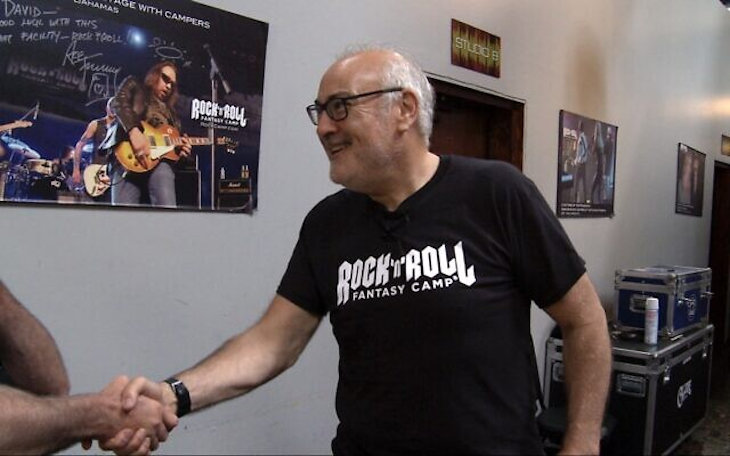
“For my first camp, I called Mark Farner from Grand Funk Railroad and Clarence Clemons from Bruce Springsteen’s band. Mike Love from the Beach Boys was there, too,” Fishof says. “That first camp got so much publicity, it was incredible. But I lost money and decided not to do it again. But then people kept asking me about it, so I decided to try it again. I went to England to see Roger Daltrey, from The Who, who had just done a tour for me. He said to me, ‘If you introduce me to Levon Helms from The Band, I’ll do your camp,’ which is what happened.”
Those original camps even served kosher food. According to Fishof, the Rock Camp has a therapeutic value, too. He feels many people are, understandably, intimidated about being on stage with their heroes. But participating in the camp forces them to overcome that fear, which is transformative, and the impact often lasts way beyond the program’s five-day schedule.
It’s only rock ’n’ roll, but he likes it. And he likes it without selling out.
“Most people think the camp is about jamming with rock stars, not realizing that the results will be, ‘If I can do this, I can do anything,’” Fishof says. That was also his inspiration for creating the film, Rock Camp, The Movie, which he recently released. “People are scared. I made the film to show people not to be scared. To come. I understand why people are scared to come. But the ones who attend have the most life-changing experience. There’s nothing to fear. I want people to see that anybody can do it. I also look at the camp as a process. It’s a place where people can shed their negativity, find themselves, and get rid of a lot of the negative traits they were raised with.”
But more than that, the campers get tight with their rock star counselors. “Many of the artists have told me, ‘I always seat my campers in the front row at my shows. You know why? Because once they’ve performed on stage with me, they can’t sit anywhere else.’”
The Rock Camp has been huge for Fishof, but most of all, he hasn’t forgotten his roots.
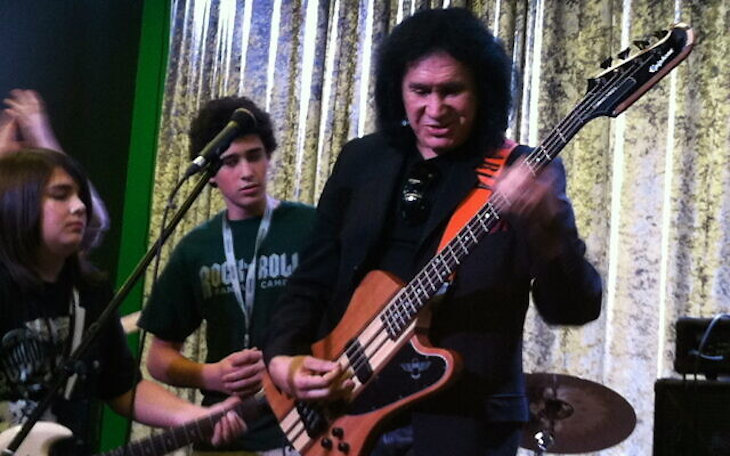 KISS founding member Gene Simmons rocks out with campers at Rock N’ Roll Fantasy Camp.
KISS founding member Gene Simmons rocks out with campers at Rock N’ Roll Fantasy Camp.
“People think I am weird because I am hanging out with these rock stars, but I love Jewish music,” he says. “It keeps me grounded. Shabbos keeps me grounded. You’re in this business and it is so easy to go the other way. People who are successful in the music business – people who are also trying to keep Shabbos and kosher – contact me, but they’re not sharing their Judaism with their bosses and friends. They’ve heard my story, and ask me, ‘Can you give advice about how to tell my boss that I don’t want to work on Shabbos?’ I love that. If you can make a difference in people’s lives like that, that’s great. That’s why I love doing this.”
It’s only rock ’n’ roll, but he likes it. And he likes it without selling out.
